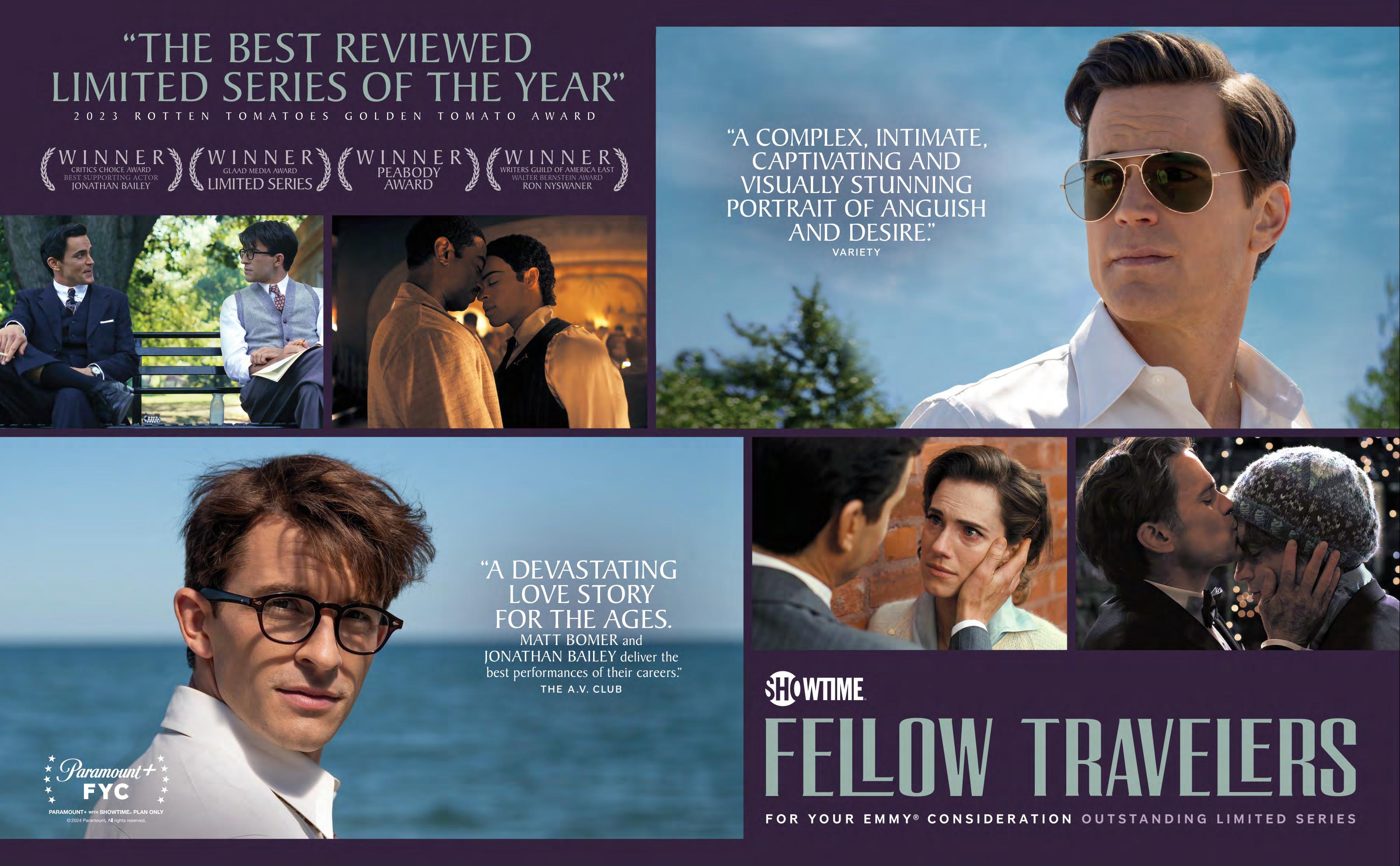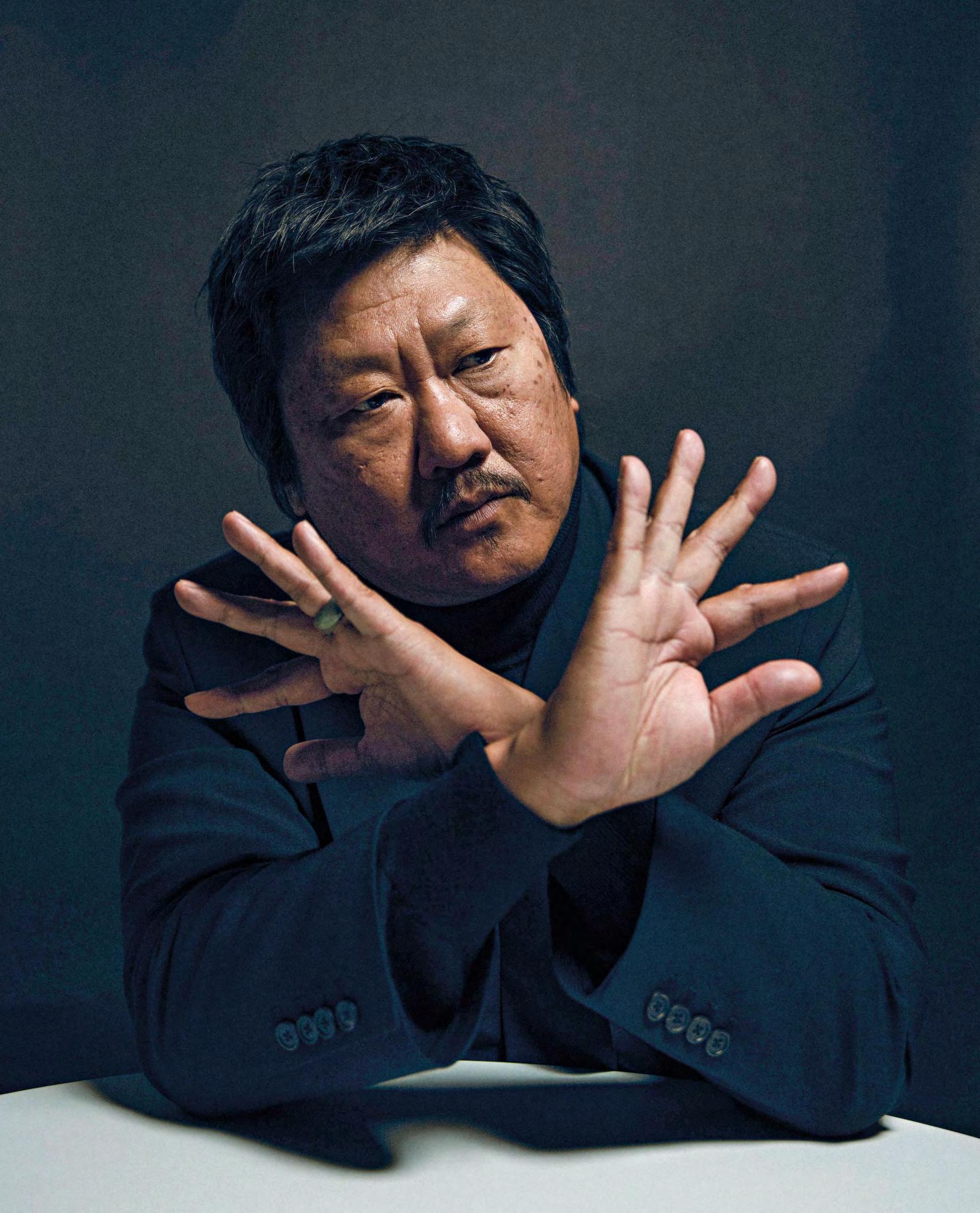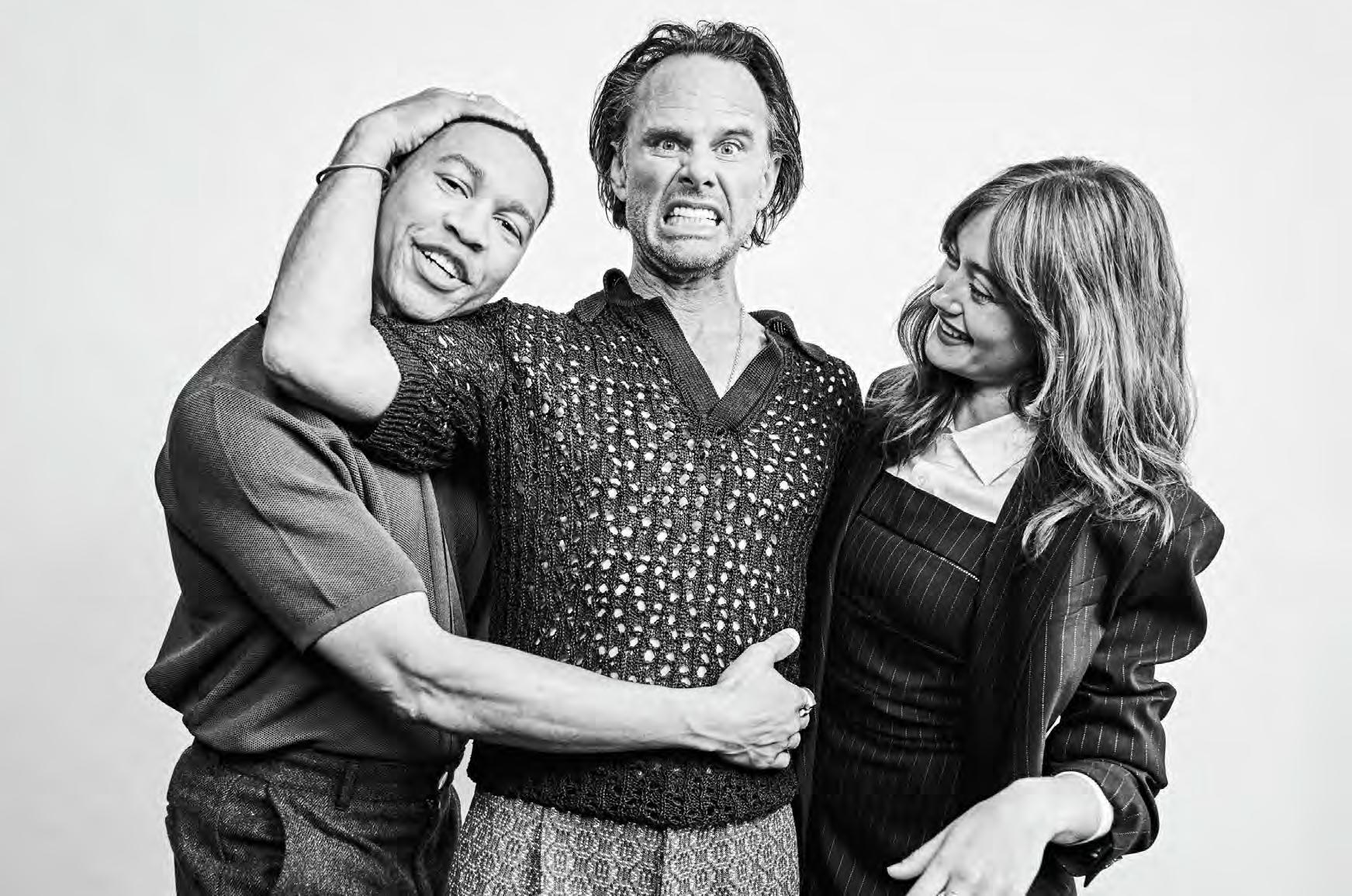
22 minute read
Making ‘Fallout’ was a blast for its stars
from LA Times (test)
by Marketing
Filming conditions were tough at times, but Aaron Moten, Walton Goggins and Ella Purnell say their Prime Video series went off with a bang.
IF YOU THOUGHT “FALLOUT,” THIS YEAR’S SMASH TV video game adaptation, would just capitalize on the success of 2023’s “The Last of Us,” you’re in for a fun, funny, socially conscious surprise. ¶ The Prime Video series, overseen by HBO’s “Westworld” cocreator and “The Dark Knight” screenwriter Jonathan Nolan, launches from Bethesda Softworks’ roleplaying franchise concept of a future yet 1950s retro society destroyed in minutes by a nuclear war. The surface is still a wasteland 219 years later, but the descendants of wealthy survivors have flourished in isolated, luxury bunkers built by the VaultTec Corp. ¶ In the show’s opener, chipper, capable but otherwise unprepared Lucy (“Yellowjackets’” Ella Purnell) leaves her vault to rescue her kidnapped father. In the sandblasted remains of Los Angeles, she encounters the grotesque, eatorbeeaten reality of the remaining havenots. Key among her new companions are Maximus (Aaron Moten, “Emancipation”), a squire in the militaristic Brotherhood of Steel who’s illegally appropriated a knight’s power armor suit; and the Ghoul (Emmynominated “Justified” actor Walton Goggins), a wicked, decaying bounty hunter kept alive by drugs for centuries, whom we see in prewar flashbacks as the goodguy cowboy actor Cooper Howard. ¶ With their Southern manners intact, Austinborn, Juilliardtrained Moten flew in to L.A. from his home in Iceland and Georgiabred Goggins arrived from the Thailand set of “The White Lotus” Season 3 to join Londonborn Purnell to talk to The Envelope. None of them played “Fallout” games before the show, and only Purnell has done so since. Badly, she says.
How was filming part of postapocalyptic L.A. in an African desert?
ELLA PURNELL Namibia was beautiful, the scenery is incredible. But we were really up against the elements. In New York, it was incredibly hot and then incredibly cold. In Namibia, sandstorms! The scene where I come out of the vault and am talking to the farmer, there was this crazy sandstorm and so much sand was getting in my eyes that I was crying all the way through. Jonah [Jonathan Nolan] was like, “This isn’t an emotional scene, you can pull back.”
What was the Ghoul makeup ordeal like?
WALTON GOGGINS Five hours in the chair was challenging out of the gate, but then it becomes the new normal. There is a meditation and a concentration involved with beginning every day spending that amount of time in the chair and going into that headspace.
But when I say it was hot, it was extremely hot. I didn’t anticipate how fatigued I would be. I’m not one to complain, but the very first day, sitting on a log by myself, I thought, “Man, I don’t think you can do this. You’re not that young anymore.”
How about you, Aaron? There were practical versions of Maximus’ power armor that you wore, correct? AARON MOTEN There were several aspects of the suit. One we called the “clamshell” that can’t move, but the back of it opens up so you can step into it. Then there is the top half; it’s about 50 pounds. You feel like a weird metal gorilla walking around in that thing. The motorized helmet is part of the weight that gets added to it, there’s a battery element.

Any time you see the full suit in motion, it’s Adam Shippey, whom I call our stunt extremist. That suit is 100 poundsplus. In between takes, we’d find ways to prop each other up because again, when you’re not a complainer, you are suffering a lot, barely able to breathe because of the weight.
And toughest for you, Ella?
PURNELL I did a lot of fight training and all, but I think I speak for all of us when I say it was f— fun! For all of the challenges, for all of the insane torture scenes, the weather ... it was so fun. And I did so many gross things on this show! I mean, biting off the Ghoul’s finger and spitting it out; let me tell you why that was gross. We only had one finger and we were trying to get that shot before the sun went down over a building. We filmed fast, no rehearsal; me and Walt and trust and communicating. I was probably biting your actual finger a little too hard — I’m still sorry for that — then they’d put the fake finger in my mouth and I’d spit it on the ground and stomp on it. Then you’d pick it up, dunk it in some water and put it back in my mouth. We’d do that over and over again. By the end you’ve got sand, you’ve got sticky blood, my harness is still on, and your finger’s probably bleeding from me biting it.
One thing “Fallout” has that most dystopian shows don’t is a sense of humor.
↓ Ella Purnell stars as Lucy in the video game adaptation “Fallout,”


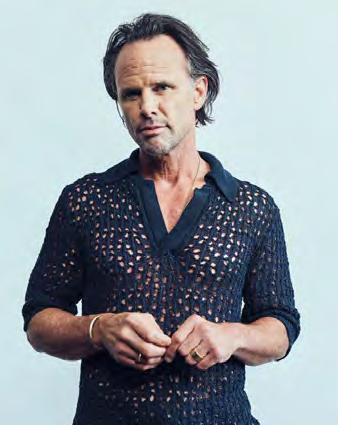
GOGGINS That’s built into the DNA of the property itself. “Fallout,” the game, has this subversive, satirical humor. There’s an audience that had to be expecting a version of that.
PURNELL I like the tone of the show. I don’t love watching postapocalyptic stuff because it’s depressing and it stays with me for months. I work very hard to maintain a positive outlook, and I try not to indulge myself in catastrophic thinking. But I will say that humans always find a way to survive, and one way we survive is by using humor as a coping mechanism.
Anything else about the show’s metaphorical commentary?
MOTEN This Eisenhowery on steroids, prewar future world is removed enough from our reality, with parallels, so that we can see ourselves outside of it but also in it. By watching that world go through what they go through is, for us, to send ourselves there so that we don’t [actually] do it.
GOGGINS This isn’t the first time this has been done. In the last decade, it’s been done maybe more than ever before in the history of this medium, [the theme of] naivete, and morality is a morality of convenience. We live in a bubble. There is that experience for the 0.5% or the 1% or the 10%, however you break that down, and then there’s the reality that everyone else lives with.
If you can take this topic, this reality of the world for so many people on both sides of it, and make it palatable, then you’re doing a service to the community that watches your show.

All of your characters go through eyeopening journeys and major moral evolutions. How did each of you approach their development?
MOTEN The most challenging aspect of Maximus is that he really is a heroic person that we see glimpses of, but he’s at war within himself. He’s just as brave as he is terrified of this world in which he exists. I felt like this was an opportunity to show a side of masculinity that doesn’t get portrayed often on film.
PURNELL It was reiterated to me time and again that Lucy is our introduction to this world, and there’s a lot of pressure being the good guy. OK, she’s good, she’s morally righteous, but how do you play that and play this relentless optimism? Y’know, she’s incredibly privileged and quite not selfaware, especially at the beginning of the show. That can definitely come across as annoying and it can lose people quickly. Somewhere in the back of my mind was I could be too unaware, too privileged, hitting my “okey dokeys” a little too hard. You have to break that character down just to let her build herself up as herself and not a product of VaultTec. Which is why her relationship with the Ghoul is so crucial.
And I guess the key question for you is, how much,if any,of innocent, decent Cooper Howard still exists in the cynical, cruel Ghoul?
GOGGINS The biggest challenge was how to get these two people to speak to each other over time. Not just make a decision about that from an esoteric point of view, but practicallythe same person at very different points in his life. How are they similar and how are they different?
You have to understand Cooper Howard in order to understand the Ghoul. You have to see everything that he had to understand everything that he’s lost.
I also truly believe that his journey isn’t solitary. It is meant to be, in some ways, a metaphor for what the world lost. It is through Cooper Howard’s eyes that you see what life was like before the bombs were dropped. It’s not just his experience, but it’s the world that was fallen.
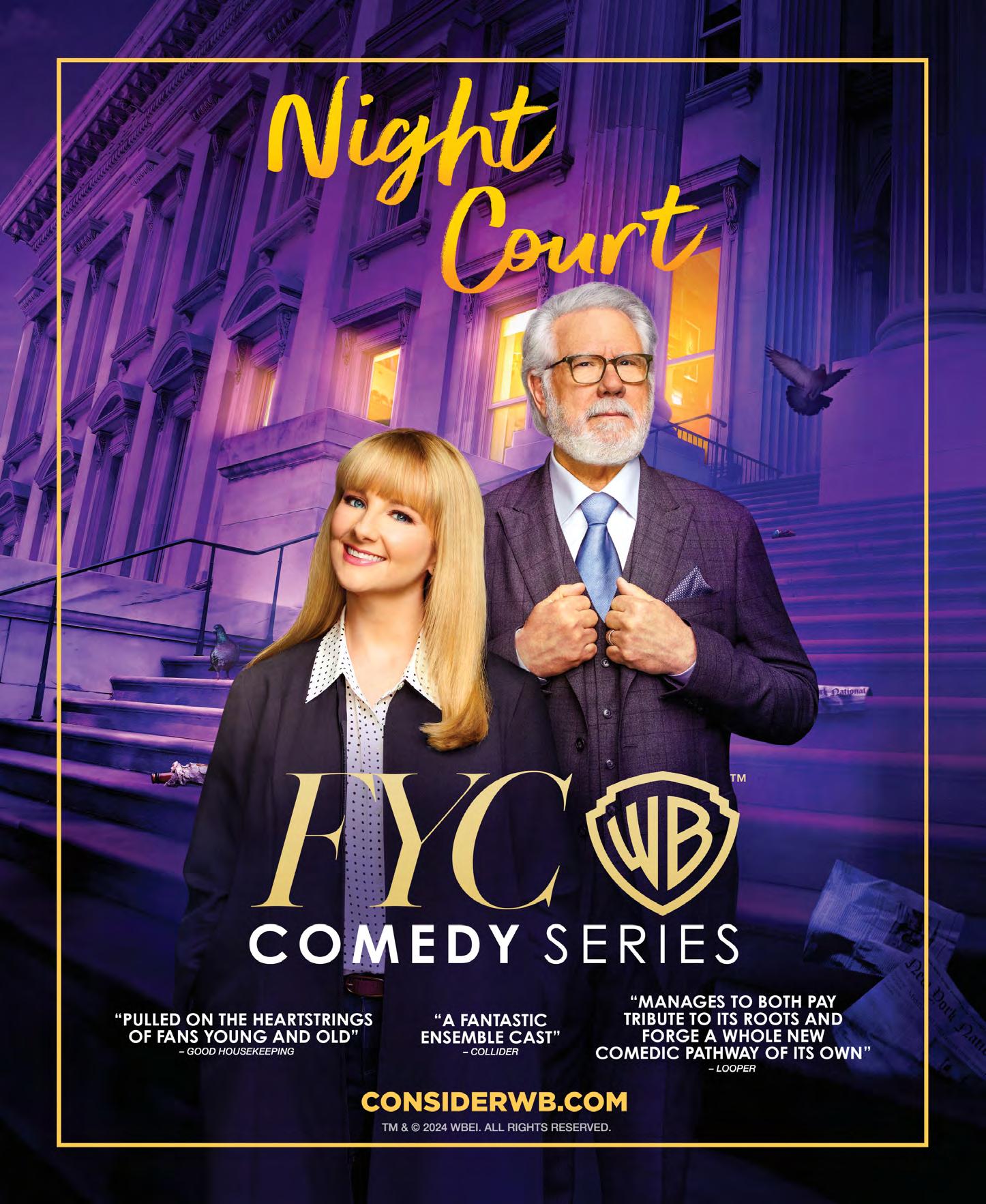

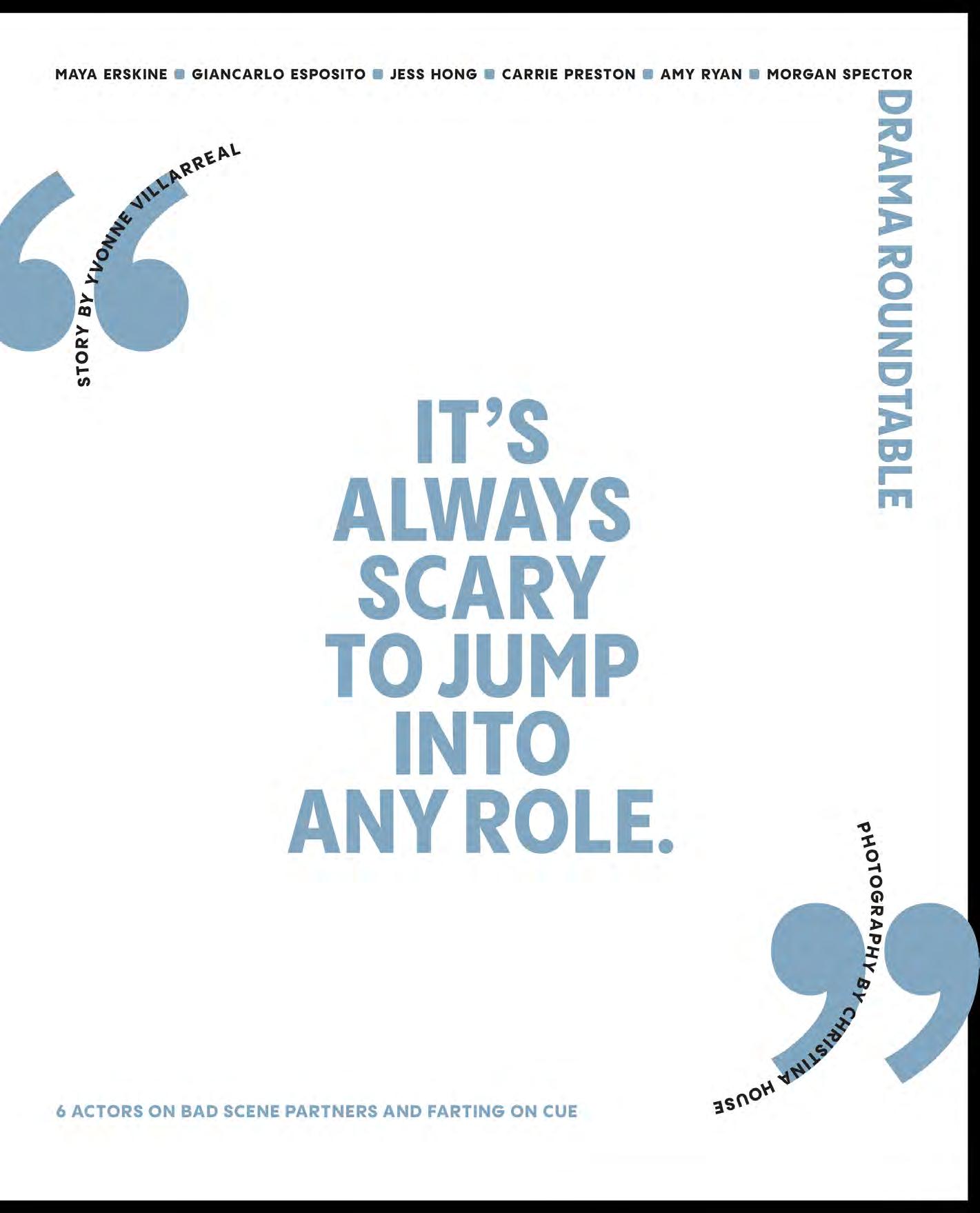


TO MAINSTREAM SUCCESS HAS TO START SOMEWHERE— IT COULD BE A small role on an episode of “Quantum Leap” circa 1991 or a single line in a CW drama that gets left on the cuttingroom floor. ¶ During the recent Envelope Drama Roundtable, actors Maya Erskine, Giancarlo Esposito, Jess Hong, Carrie Preston, Amy Ryan and Morgan Spector flashed back to the twinge of nerves and selfdoubt in those early years when the seemingly small roles, approached with total commitment, set their foundation — even if things didn’t always go smoothly on set. ¶ “I was cut from it,” Erskine says of her first time on a set. “It was ‘Hart of Dixie’ on [The] CW. I just had one line that was like, ‘Is this seat taken?’ And I swear to you — have any of you seen ‘The Comeback’ where Lisa Kudrow runs her line over and over throughout 24 hours? That’s what I did on Photo Booth. All night, [I] was like, ‘You gonna take that seat?’ I kept doing it, and then on the day [of shooting], I blanked. It was this huge machine that you’re just this tiny part of and I was like, ‘Oh, so there’s no rehearsal? We don’t do this, figure it out together? You just show up?’ And they cut it.” ¶ Still, the experience can leave a lasting impact, said Ryan, who arrived to the “Quantum Leap” set brighteyed with uncertainty. ¶ “I didn’t know what I was doing, but I was so excited to be on television,” she said. “If I could tell my younger self, I’d say, ‘It’s OK to ask a question. There are no dumb questions.’ I didn’t know that. I didn’t know what a mark was, I didn’t know what a boom was. I didn’t know that you’re not supposed to overlap, but this gorgeous woman, she leaned [in] and she whispered, ‘That’s your mark.’ She gave me all the ropes of the day, and I’m very grateful to her.” ¶ The conversation on a late April day was as wideranging as the roles the actors brought to the screen this season: Erskine, a jaded millennial spy in “Mr. & Mrs. Smith”; Ryan, a former rock singer and the stepmother of a missing young girl on neonoir drama “Sugar”; Esposito, a desperate man who becomes a driver for the mob in New Orleans in “Parish,” as well as the obscenely rich and hyperarticulate drug baron in “The Gentlemen”; Hong, a brilliant young physicist in science fiction epic “3 Body Problem”; Spector, a railroad tycoon who rules 19th century New York City in “The Gilded Age”; and Preston, a quirkylawyer with a knack for sleuthing in “Elsbeth.” on the spot—but that you requested or suggested that your character fart in the show?
Their conversation here has been edited for length and clarity.
ERSKINE It’s such a beautiful story. Well, to be fair, they were describing to me a scene where Donald’s character would fart. It was all about all the inbetween moments in relationships that you don’t see a lot on TV. So, the first time someone farts in a relationship — what is that like? And what does that vulnerability do to the relationship? And I was like, “Can my character do that instead? Because I feel like that’s something I relate to.” I want to see what that would do to us. How would that make him react? How would that make her feel more exposed? And would it help them fall more in love? They were like, “Yeah, OK. You can fart.”
MORGAN SPECTOR I feel like that scene where she farts and then he covers for her by going outside and looking as if something dangerous may have happened — that was the scene where I was like, “Oh, this show’s the s—. This show is up to something.” It was so great. It was funny. Have you suggested your own kind of details like that in any character you’ve played?
Go online at latimes.com/ envelope for the video coverage of this conversation or tune in to Spectrum News 1, where it will air throughout the month.
SPECTOR I really am the kind of actor who likes to show up and just do what I’m told. I’m very much creatively kind of a bottom, so not really. I think that’s kind of what I’m in it for. “Please tell me what to do and just let me obey.”
GIANCARLO ESPOSITO I like to pay attention to a lot of the details. I feel like it feeds me when I’ve created a bit of a backstory, detailwise, for the character. They’re little clues for me. Those small things oftentimes help me because I play a lot of characters without a lot of words some times. So to me, those become really important, they fill in the gap of what the writer has maybe written in the stage direction but hasn’t written in the dialogue. On “Breaking Bad,” I had an elevator scene and I realized I had played this character in a formidable way. You never saw a chink in his armor. And I wanted so desperately to show that he was human and not a robot, you know?
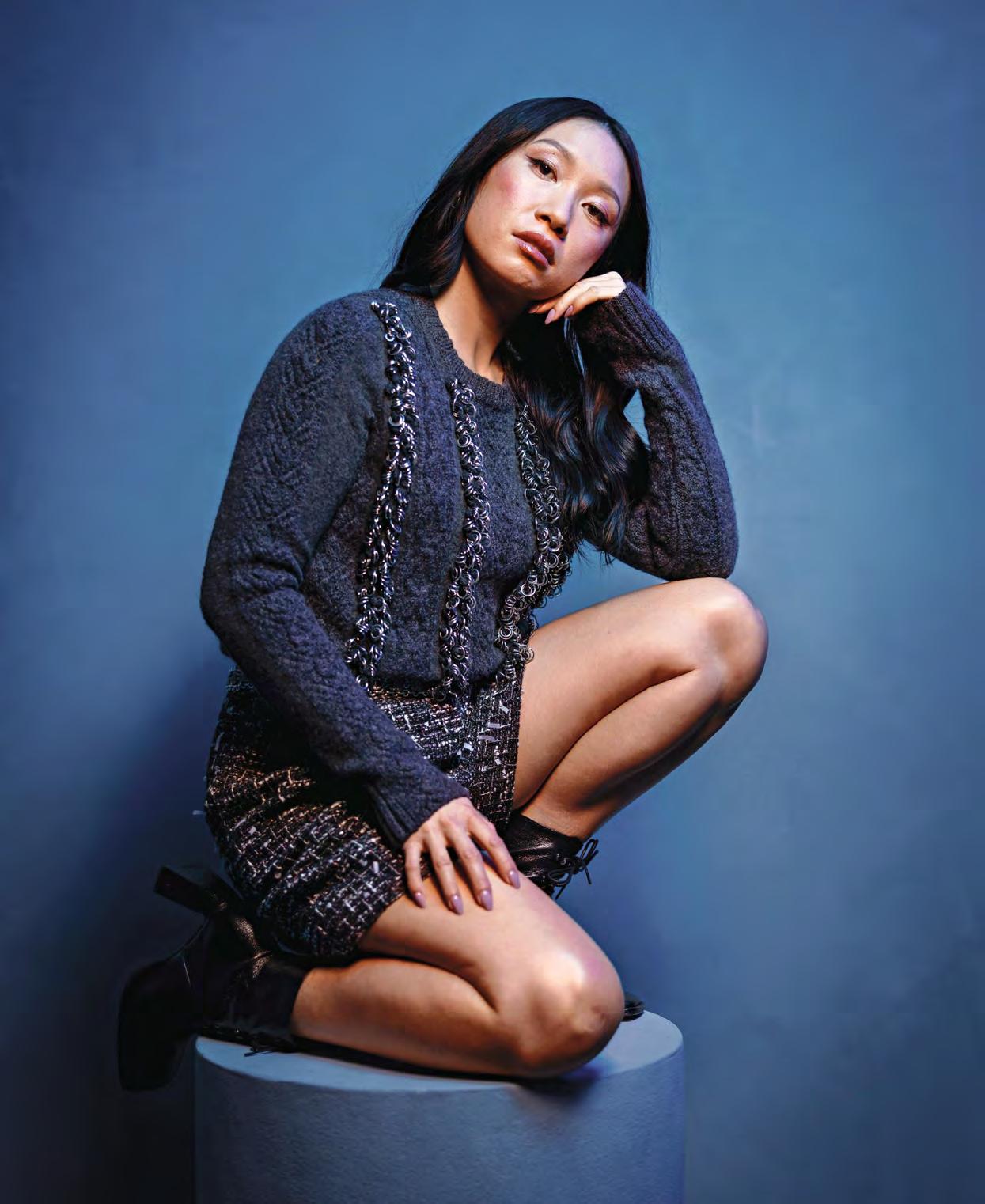

[With the] elevator scene, it was quite chilling. My emotion was completely stonefaced and the elevator door closes, and I started to do one little thing, [tapping] my finger. My hands were at my side, just to see if the director would notice. It was for me, because it allowed me, internally, to release some energy that was feeding this idea that, finally, [Gus] was nervous. That something was gonna happen to him, and the director came in and he said, “I see that you are doing something with your hand.” And I said, “Oh, you noticed that, did you?” And he said, “Yes, I want to go down there [with the camera] and get it.” I said, “You go down there and you get it, baby.”
Carrie, Elsbeth Tascionimakes her debut in “The Good Wife” at the end of the first season, in a threeminute scene. And she developed into this fanfavorite character. How has it been leaning into her as a lead character?
CARRIE PRESTON At first, I got nervous because I was like, “Oh, no, wait, wait. I’m the side dish. I’m the funny one. I’m the quirky thing. ... They’re gonna get tired of me.” That was the fear; it’s like, “It’s gonna be too much.” And then it was, “No, I just have to show up and try to solve the scene. Each day, there’s just more scenes.” And then also just giving myself permission to let the character evolve and not feel like I have to recreate something that I already did. It’s a police procedural, so it is a drama with this circus dropped down into the middle of it, which is my character. That’s fun too, because I’m able to live and breathe in it a little more. I have been able to do a lot more of a dramatic, poignant — just a deeper dive with her that was not what I was being hired to do in those other shows.
So many of you started your careers on the stage. What excites you about each way of acting? Onstage, a character lives for a few hours a night. On TV, you have a character that develops over a season, sometimes multiple seasons.
SPECTOR I guess the thing about theater that I really love is that you do this whole process, and then at the end, they give it to you and you get to go out and try to, over the course of however many nights you

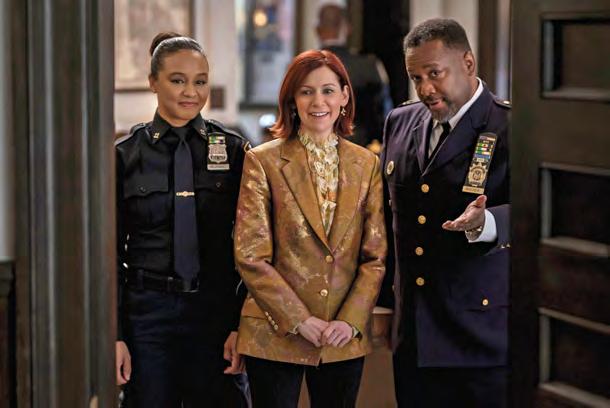
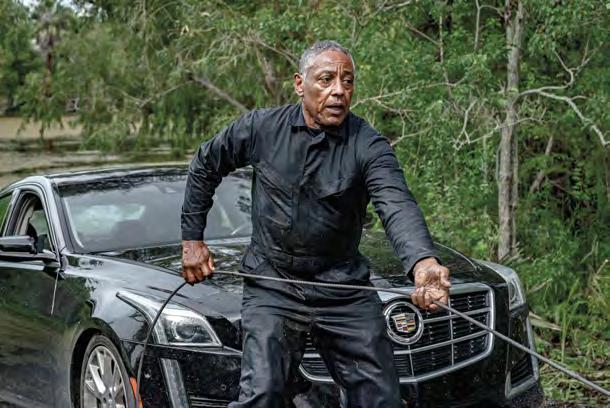
1 Donald Glover and Maya Erskine in “Mr. & Mrs. Smith.”
2 Carra Patterson, left, Carrie Preston and Wendell Pierce in “Elsbeth.”
3 Giancarlo Esposito in AMC’s “Parish.” get to play it, you get to just keep digging into it and get to keep trying to perfect it. You can have a down night. I feel like it’s a little bit more like being an athlete in some way; you can have a night where you’re, “Oh, I didn’t have it tonight.” And the next day, you come back and redeem yourself in some way. With TV and film, you have a down day, you’re like, “Oh, there it is. I got to look at that for the rest of my life. I guess I should have gotten more sleep or whatever.” The thing I have learned to love about working on camera is that you really can find these little things that you don’t know where they come from, or just a little way of getting through a scene that maybe you couldn’t have thought of, but it has this energy, or a thought occurred to you in a moment and you get it. And you couldn’t probably do it again if your life depended on it. There’s an intuitive thing that’s happened, and it makes the moment work, it makes a scene work. You can’t keep that on the stage in the same way.
AMY RYAN There’s this agreement with 1,000 people, or however big your audience is, these strangers in the dark that happens [onstage], and it does affect you. Once you settle into your own, there’s this conversation, or how you’re moving them. “Doubt” had really great comic moments, and then as the actors onstage, we knew, like, “Oh, just you wait, here comes this next.” You can feel the silence just wash over. I’ve never experienced that on film or TV.
ESPOSITO It’s a shared energy that you feel from the audience. It’s palpable. It’s something that can’t be stopped. Once the show starts, you’re either on the train or you’re off it.
RYAN I feel like the closest [to that experience] on film — I love when they put up two cameras and do coverage [of both actors] at the same time. Because then I’m like, “OK, we’re in this together, right?”
ERSKINE Can I ask a question? Has anyone ever had an actor — not to call out anyone — but had an actor, once it wasn’t their coverage, totally turn off?
ESPOSITO I’ve had an actor leave.
SPECTOR I’ve had actors put their standins in.
ESPOSITO Yeah, just say, “I’m gonna see you.” And I was there for their side, and they just leave on my side. And at that time, I was a less established actor and didn’t feel like I could ask. I’ve since learned that really respectful actors, truly respectful actors say, “Would you like me to stay?” I never ask to leave because there will be an imbalance on each side. It’s weird when that does happen because I try to say, “Well, by you not being there, that affects my performanceand will eventually, in turn, reflect on yours.”
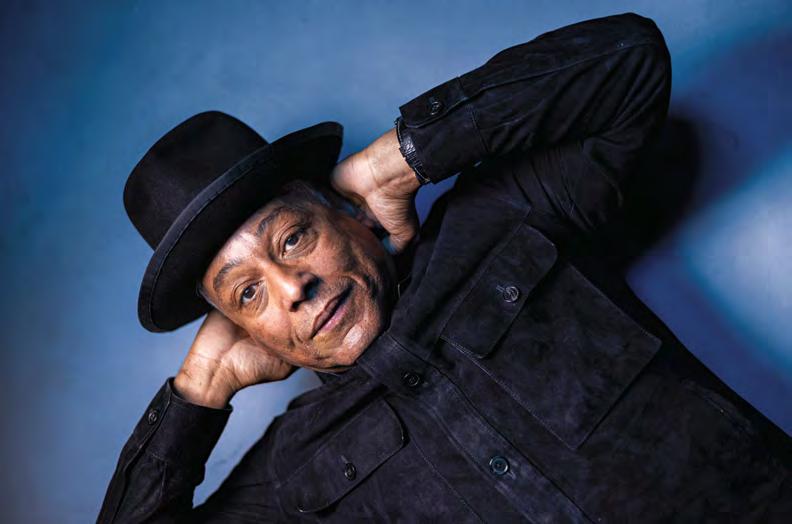
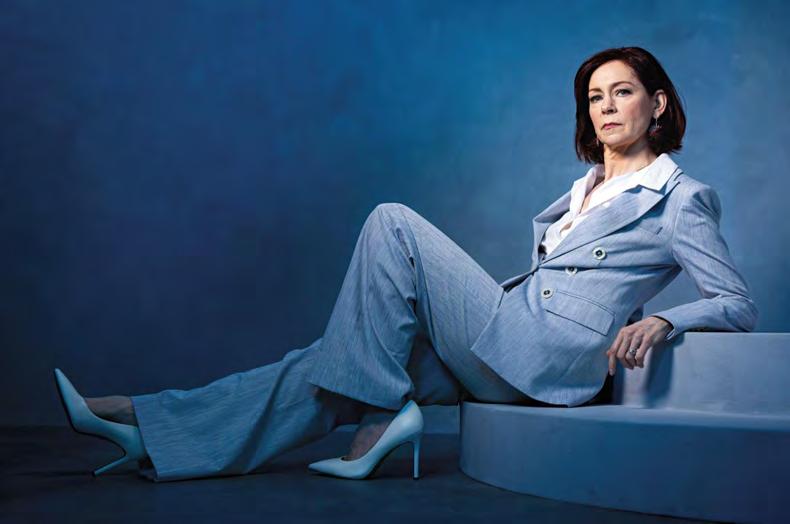
Maya, it feels like you asked because— ERSKINE Because I have a famous story in my head of someone having a standin once, and I think it was a big actor, and the standin would just go, “Peas and carrots, peas and carrots, peas and carrots.” And wouldn’t say the line even.
JESS HONG I didn’t have peas and carrots, but I did have someone [stand] in for the emotional closeup. This actor was tired and went away for a nap, so the third assistant director, who was lovely but a totally different vibe, [stepped in]. She’s like, northern English and is just reading out these lines that are supposed to be really tender. It was sweet. She did try.
Jess, before “3 Body Problem,” you were doing kids’theater in New Zealand. Tell me about getting that call, “You’re gonna be on the show from the creators of ‘Game of Thrones.’” How did that prep you for doing work in front of a blue screen?
HONG Nothing can prepare me for that. They don’t have that class in drama school. Yeah, so I was on this yearlong tour with this charity, Duffy Books in Homes, and we went to underprivileged schools around the country. So I went to some of the most beautiful parts of New Zealand. I got to see places that I never would have seen, very spiritually fulfilling. Age 5 to 12yearold kids. For some of them, they’ve never seen theater, they have no idea.
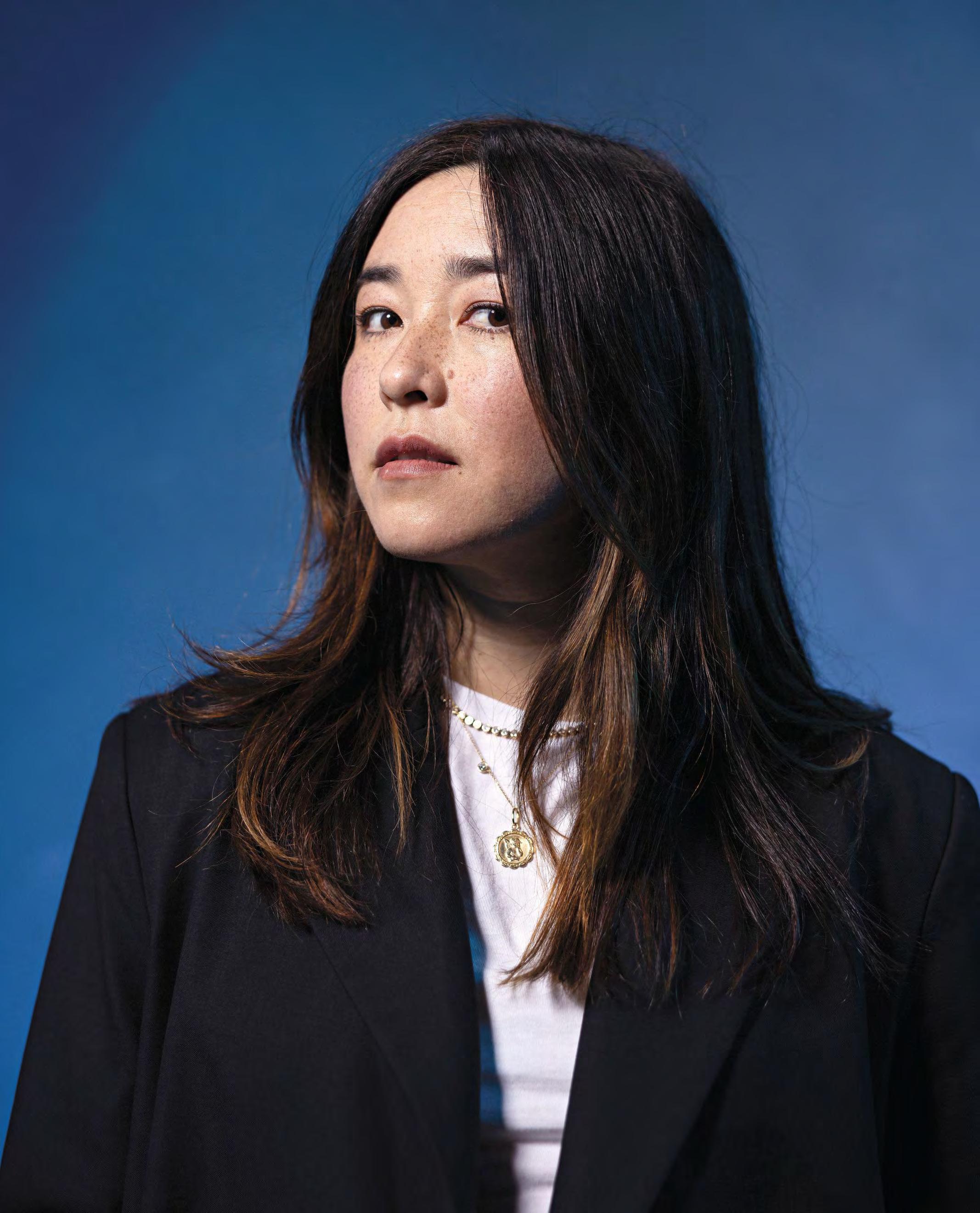

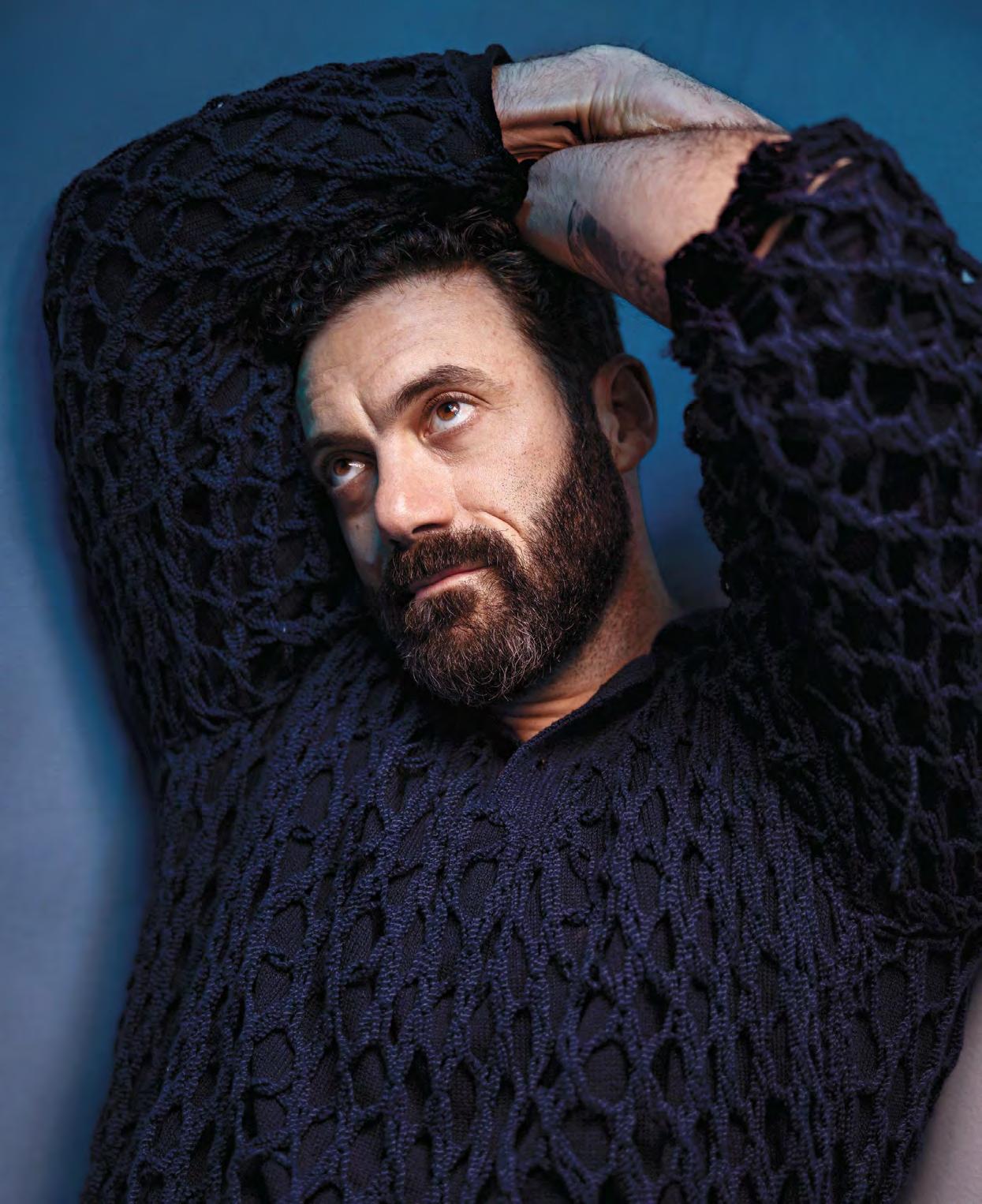
What was great was that having that job, which was incredibly nourishing for my soul and a great distraction from that call, meant that I wasn’t so caught up in, “Oh, I really hope this happens. I really want this.” I wasn’t thinking so intensely about that. Then I go into cold London [to shoot “3 Body Problem”]. I don’t see sun for 10 months, I go straight into studio stuff. Nothing can really prepare you for walking onto a soundstage. I’ve never worked on a soundstage before.
Walking into a giant warehouse, and there’s hundreds of people there, and they all know my name. “Hey, Jess. Morning, Jess.” And I’m like, “I haven’t met any of you. OK, cool.” All eyes [are] on you, so you do feel that pressure spike up: “I have to do well, but I can’t just do well, I can’t just do the perfect thing, I have to be free. How do I be free inside this very structured space?” That was a real learning curve, trying to figure out how to find spontaneity and that spark even though you have to match the exact same thing and move your hand like this [demonstrates] at that time because that’s what matches the wide shot.
Last year will be remembered as a critical turning point in Hollywood because of the dual strikes we saw from writers and actors. How will you remember that period of time?
RYAN AI scares the bejeezus out of me, and I know it’s probably too late in so many ways, but when that happens, I’m like, “I’m out.” I’m gonna find something else to do. I don’t want to be replaced by [a digital double]. But too many people were hurt.
Did it make you more conscious of the business particulars or the fine print?
So often you just want to focus on the creative, but it feels like now more than ever we need to pay close attention to the business side of things.
SPECTOR I am sort of interested in the business stuff anyway, just because I feel like it drives a lot of what ends up happening with us. Like you were saying, [Amy, people think], “Oh, precious actors, what are they whining about?” But I feel like we had public support really solidly throughout, partly because I think unions are more popular than they’ve ever been. Everybody’s realizing how unequal and unfair our economic moment is. And that if they don’t have the power to negotiate collectively, if they don’t have solidarity, they’re going to get screwed, and I think everybody kind of saw the actors’ and writers’strikes, really, as a kind of inspiring thing.
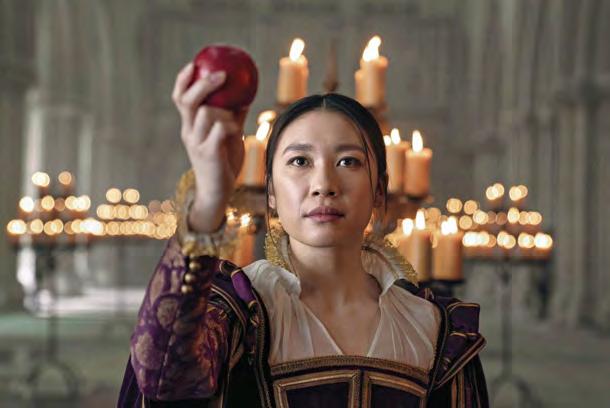

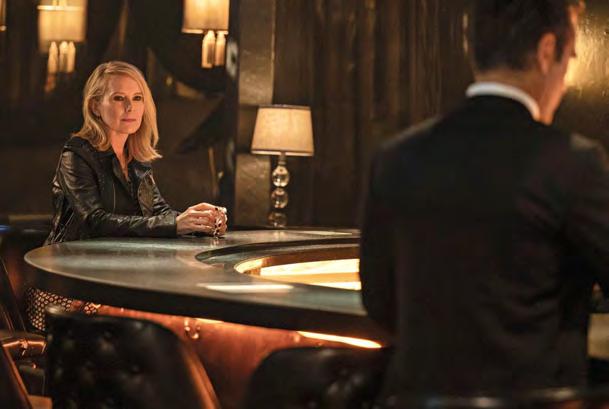
1 Jess Hong as Jin Cheng in Netflix’s “3 Body Problem.”
2 Morgan Spector, center, in Max’s “The Gilded Age.”
3 Amy Ryan and Colin Farrell in Apple TV+’s “Sugar.”
